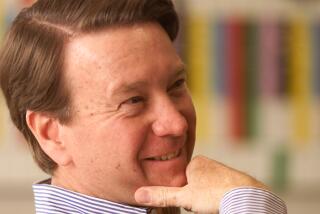BBC Chief Sees U.S. TV Alliance
- Share via
Michael Checkland, who’ll soon be celebrating his first anniversary as director general of the British Broadcasting Corp., flew all the way from the BBC’s London headquarters just to do lunch in Hollywood.
Checkland arrived late Thursday night to address a Friday luncheon of the Academy of Television Arts & Sciences, then headed back to his duties in London. “It’s a long way for a lunch, really,” he observed, upholding the fine, old British tradition of understatement during an interview that morning.
The brevity of his stay here notwithstanding, Checkland had plenty to say about Hollywood. Although the topic of his speech was his five-year master plan for the BBC’s future, he offered some thoughts in the interview on the differences between the British and American television industries and what he hopes will be a profitable and growing partnership between the two. Fourteen percent of the BBC’s programs are imported from the United States.
When asked which he believes to be superior, dignified British “programmes” such as “Masterpiece Theatre” or their flashier Hollywood counterparts, Checkland, 51, offered politely: “I’m quite happy with British television--that’s a diplomatic answer.
“It’s different, you see,” Checkland continued, warming to the subject. “Your news and current affairs, when I look at morning or evening shows--which is when I tend to be in hotels--they seem to be first class.
“There is a particular attraction to American action-adventure, there’s a faster pace to it, and some of your comedy is just different--we like it,” he added. “I think there are too many attacks on one (system) being so much better than the other. They’re just so much different in texture.”
But, Checkland added firmly, programming produced by the BBC will never be too strongly influenced by American tastes. “I think we recognize that we have different skills and different ways of doing programs. It’s something we’ve maintained and have been able to maintain over the years.”
One big difference, Checkland pointed out, is a higher dose of TV violence in Hollywood than in the United Kingdom. During Checkland’s tenure, the BBC has been embroiled in a controversy over screen violence, a concern triggered by the so-called Hungerford Massacre last August, during which Michael Ryan gunned down 16 people before turning the gun on himself.
Although no causal connection between Ryan’s actions and TV violence was determined, British television began a crackdown on violent American imports. The BBC refused to air four particularly violent episodes of “Miami Vice” and continues to refuse to purchase “The Equalizer,” as well as feature films such as “Straw Dogs” and “A Clockwork Orange.” Checkland said a council to address the issue of broadcast standards should be in operation in the United Kingdom by the end of the year.
He added that the BBC isn’t complaining about the U.S. product, however. “We don’t have a problem because we feel we are in control of our own destiny in what we acquire (from Hollywood),” he said. “We are in a position to decide just what is appropriate for the British audience.”
Checkland said that while the British audience has a harder time accepting violence, the American audience has a harder time accepting sex. “You have much more difficulty accepting things that we find acceptable, like episodes of ‘The Singing Detective,’ ” he said, referring to a six-part BBC series by playwright Dennis Potter, which aired on some PBS stations here and contained fairly graphic sex scenes.
Checkland stressed in both the interview and the speech, however, that the BBC’s main focus in the next five years will not be on whether to purchase Hollywood shows, but rather on producing as much of its own programming as possible and providing an outlet for more independent British television production not generated by the BBC or ITV, Britain’s other major network.
The British, he said, might take a tip from Hollywood in pushing for more minority participation in all phases of its programming. “Our record does not match yours in this,” he said in his speech. “We promote too few women and we employ too few members of ethnic minorities in our multiracial society.”
Checkland remained serene about conflicts with the government that have dogged the BBC in the last several years. “There is pressure--there has always been pressure--but I think we’re resolute that we’re not going to change because of it,” he said.
Among the problems: The corporation’s former director general, Alsidairc Milne, resigned following controversies over what government leaders charged was a left-wing bias in the BBC’s coverage of the conflicts in Northern Ireland and the 1986 American air attack against Libya, among other issues. Milne had also been charged with bowing to pressure in deciding not to air a six-part documentary called “The Secret Society,” which, the Thatcher government charged, compromised national security by disclosing information about a British spy satellite.
And just before Checkland took over the position, the BBC’s Scottish headquarters was raided by a British police team, which seized tapes, films and editorial material.
“We’ve always been accused of leftist bias and rightist bias, and that continues,” Checkland said. “Any organization that is independent and tries to be impartial in its reporting is going to upset a lot of people. The fact is, we have no institutional bias one way or another. I think if we had, we wouldn’t be fulfilling our purpose.”
More to Read
The complete guide to home viewing
Get Screen Gab for everything about the TV shows and streaming movies everyone’s talking about.
You may occasionally receive promotional content from the Los Angeles Times.






